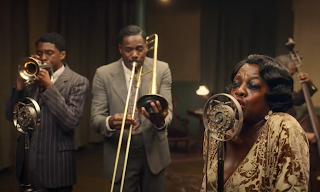Review: Ma Rainey's Black Bottom
Viola Davis and Chadwick Boseman pack an emotional wallop in this August Wilson adaptation.
2020 was a year filled with letdowns, lockdowns, delays, and emotional grief. One of the darkest moments of the year came in late-August when it was revealed that Chadwick Boseman, 41, had passed due to complications with stage 4 colon cancer. It was a shot in the gut. Boseman had been a vital figure in the Marvel Cinematic Universe playing the role of Wakandan King and Avenger, The Black Panther. He had also been noted for playing real-life icons such as James Brown and Jackie Robinson. His loss was a devastating blow to the world of film and we all miss him dearly.
Thankfully, despite a ferocious battle with cancer, Chadwick worked until the end. Providing us with two incredible performances in 2020, first as Stormin' Norman in the Spike Lee joint, Da 5 Bloods, and lastly, as Levee, an arrogant, sure-footed trumpet player in Ma Rainey's Black Bottom. If Chadwick wasn't already great taking on legendary roles, add these two to the list.
 |
| Chadwick Boseman playing Levee with smug contempt in Ma Rainey's Black Bottom |
In what has to be considered his best performance to date, Chadwick gives Levee an air of arrogance and stubbornness that almost makes him insufferable if he weren't so magnetic. Levee is a troubled man with a dark past, who believes his fortunes are about to turn around when he joins Ma Rainey and her band for a recording session in 1920's Chicago. Young, outspoken, and musically gifted, Levee firmly believes in the American dream and what you can accomplish with talent, skill, and the right approach and goes as far as to dismiss the worldview of his older bandmates.
Much of the film takes place in two locations: The studio or the downstairs band rehearsal room. Downstairs, it's Levee's show. Here, we learn about all our band members' views on the world. What has to change around them, and what still hasn't changed at all. What freedom actually means and if they even have it or are they only afforded it because of the music they play. Upstairs belongs to Ma. A fiery performance from Viola Davis sees her battle a different quandary as she struggles to maintain her autonomy and her hold on the one thing that matters: her voice. Her fights with her manager and the head of the studio reveal the battle that lies ahead for all artists about what their worth really is and how one should fight like hell if they aren't receiving their proper value.
 |
| You better give Ma her Oscar, she ain't playin' with y'all. |
Viola Davis is a revelation in this role. Capturing Ma Rainey's raw passion for her music and her ambition to be seen as a full person rather than just a show puppet was masterful to watch. What also impresses in this film is how it manages to squeeze so many important topics into such a short runtime and it doesn't feel overburdened by how much it asks or answers. That's in part to the brilliance of August Wilson's writing powerful stories from single instances in a person's life, but also to the incredible efforts of Ruben-Santiago Hudson's screenplay, George C. Wolfe's impeccable direction, and Andrew Mondshein's sharp editing. We get the entire story of our main characters as they simultaneously experience their rise and fall in a matter of 94 minutes.
We understand the time period, the prominence of the blues, the dirty dealings of record companies, and backstage politics all in one film. Wolfe carefully constructs a perfect adaptation from stage to screen with some smart physical choices: Changing the setting from winter to summer, showing interactions on the street, tense pull-in shots during monologues, and fun montages of the band stopping and starting to finally record their music all gave Ma Rainey's a vividness and a crackling energy matched by the look and feel of the film as a whole.
With the writing being as good as it is, and an impressive director at the helm, all you needed was strong performances to see it all the way through and no one is out of step. Alongside Davis and Boseman is an undeniable ensemble cast. Colman Domingo steps out from character actor status into being a legitimate leading man as he manages to steal some scenes himself with devotion and a good-natured quality that anchors the entire film. Not to be outdone is Glynn Turman as Toledo, making the case as the oldest member of the band of what life is really like. He's got several monologues as well that capture the essence of what time does to the mind and heart of a black man.
Ma Rainey's Black Bottom is one of the strongest films this year, a technical achievement with fantastic performances. It will be hard to ignore this awards season.
Way to go out with a bang, my King.





Comentarios
Publicar un comentario